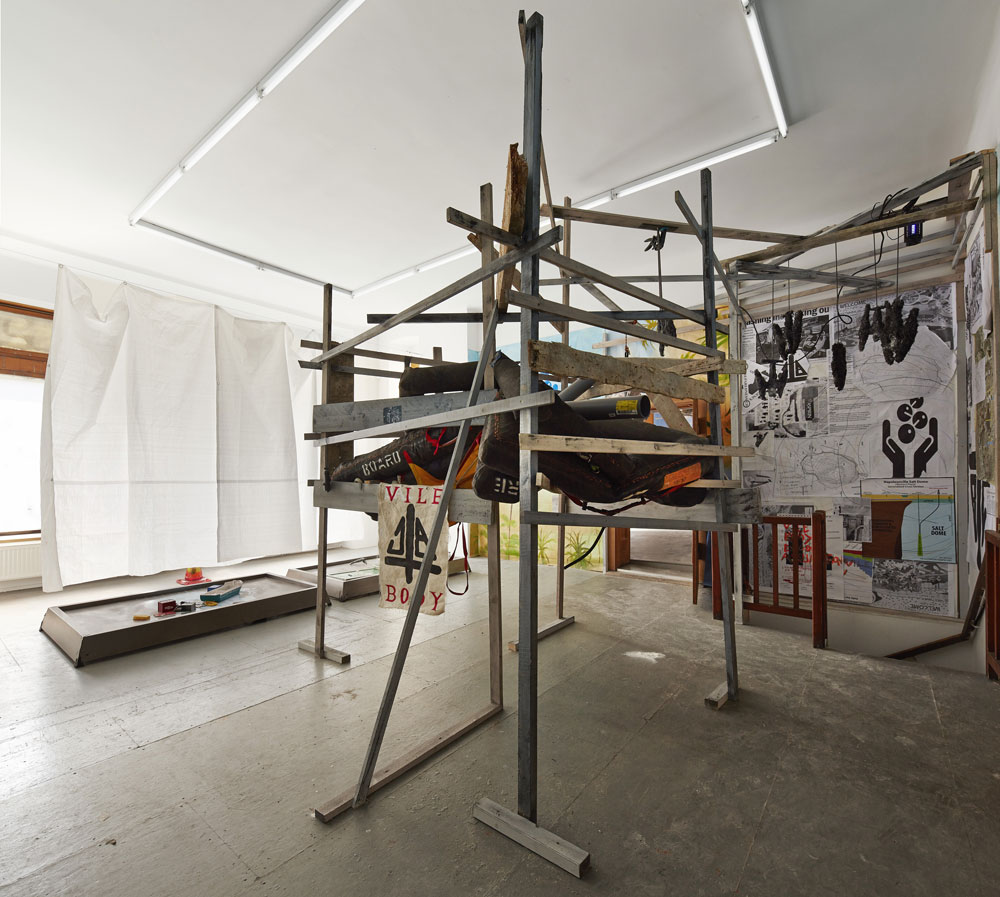Stephen G. Rhodes
Eden Eden, Berlin, Germany
Eden Eden, Berlin, Germany

Can you bear it: looking at the world? Look around, look at where you sit, or your screen. Look at where you squat, or float; look at yourself. This is the world, an insane asylum; a leaky raft, or anus. A broken craft; a grotto sucked dry by upturned white-nosed bats. An uterine cesspool, a contaminated stink, a shanty storehouse for the salient fart we call ‘art’. Here is a vacant community, in this vile, sweaty sinkhole where we procreate.

I am struggling to even look at, much less regorge, the acrid bits of world that are hurled out, unedited, with frothing fury in Stephen G. Rhodes’s ‘SWEETHAVEN ASSUMPTION: Or The Propertylessness Preparedness and Pals’: his immersive installation at Eden Eden comprising sculptures, shantytown structures, cinema or theme-park replicas, conjoined and polluted narratives, petroleum-dark paintings and three videos – all driven by the thematic engines of fluked capitalist imagination, nationalist bile and humanitarian and environmental decay that really is the world right now. We might do just as well to step outside our doors and observe the state of things ‘out there’, but then what? And wouldn’t this presume an ‘inside’ to begin with?

Rhodes’s exhibition is conspiratorial reality fiction at its most perturbing. Amid clips of children on 1980s American television, predatorially fed the foodstuffs (Popeye’s chicken) of the sourced television show’s sponsors (the video Vile Assumption, 2015), or of a Pegida rally in Dresden in which the artist, at times in a Frankenstein mask, is seen holding up signs in which those same foods are crossed-out; amid images of homes foreclosed and evacuated; amid this, in the exhibition’s basement, there is an inflatable, vulva-like raft, upright, being violently and fetishistically banged by a loudly see-sawing, coin-operated child’s rocking machine (of the kind found outside suburban supermarkets): the artist’s happy metaphor for a world fucked, or fracked, by the capitalist imaginary – the serial, compounded negligence that has led to a state of permanent expulsion, precarity or even psychosexual slavery for many – we were fed and which we feed our future in turn. And after we’ve suckled and grown fat or thin, fracked and fucked, now we pay the price, on borrowed time and credit.

The two real-fictional protagonists of this exhibition are Sweethaven Village, the name given to the fake town built by a coked-up Robert Altman to film Popeye in 1980, in Malta; and Assumption Parish, a county in Louisiana where the aggressive fracking practices of big industry (like the salt dome cavern created by Texas Brine) generated a sinkhole in 2012: a caustic leak that meant the evacuation of a whole town. ‘Another community gone’ reads a sticker on one of the makeshift wooden structures within the space: is this a communitarian rallying cry to maintain an imaginary interior, or just a racist, xenophobic utterance? On one side of Rhodes’s matrix (Assumption Parish), industry foils and devours geography (a sinkhole in the Bayou); on the other (Sweethaven Village), imagination decays, but floats even beyond place: the capitalist-cultural imaginary of a fake village that still exists in Malta: subsisting in its congenital absurdity, and now one access node for today’s movement of refugees.

The upper floor of Eden Eden was accessible through a transparent plastic tent, a cue to the ‘quarantine’ scene in E.T. (1982): an area of potential contamination elevated with a grey, uneven wooden platform. There, a houseplant urinates yellow piss, or olive oil, which streams down the elevated floor. Above us, on a wooden platform, a shipwrecked family of ‘refugees’ in E.T. (alien) form, their red, once-glowing fingertips dripping down, lies next to a large Disneyesque ‘Father Time’ figurine and the flayed (skin) heads of Minnie Mouse puppets, which hang like snuffed-out lanterns above. Rhodes isn’t playing; he’s flaying (‘when the Natchez Indians claimed a scalp they had to abstain from sex’, he writes in the accompanying booklet) – he’s bent here on exposing the fragmented fault lines of the projects of the past decades that, witnessing a series of conjoined crises – from refugees to dead geography – have only failure as outlook.

Get off my property: call it my front porch, or Europe, or a swamped Earth, or a gentrified city, the oil industry, or a pharmaceutical habit. Oil emerges as the fiat, black gold poison currency here: Olive Oyl (from Popeye), castor (oil), wax as petroleum (the totem pole of phallic, wax baby heads, Endich Proportion: Death Rate, 2014), oil as painting (Vacant Portrait: hominoid inheritor, 2016), oil as petrol, oil as industry, painting as (art) industry, oil as lube. This is world overpopulation viewed at once in macro and micro terms: in a city which views itself as an incubator for artistic ‘vision’, but where so many cells have failed to germinate. ‘Critique of overpopulation, of course, stop making art’ (to quote Rhodes’s booklet text). We know, since Thomas Malthus (whose Essay on The Principle of Population, 1798 is found here), that we shouldn’t have babies, the world can’t take them, yet we still make them; we know that industry will the eat the world, yet we still make stuff; we know that art won’t, can’t and probably shouldn’t change the world – yet we still make it. Make it – in this case excellently, without moral high-ground, but with undeniable force and the sound justice of rage.
























